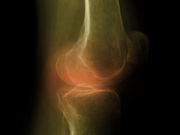Cost-effectiveness of the procedure could increase if restricted to more severely affected patients
WEDNESDAY, March 29, 2017 (HealthDay News) — Total knee replacement has minimal effects on quality of life, but the effectiveness could increase if the procedure were restricted to more severely affected patients, according to a study published online March 28 in The BMJ.
Bart S. Ferket, M.D., from Icahn School of Medicine at Mount Sinai in New York City, and colleagues examined the impact of total knee replacement in 4,498 participants from the Osteoarthritis Initiative (OAI). The results were validated in a cohort of 2,907 patients from the Multicenter Osteoarthritis Study.
The researchers found that total knee replacement showed improvements in quality of life in the OAI with small absolute changes (1.70 for Short Form-12 [SF-12] physical component summary [PCS]; −10.69 for Western Ontario and McMaster Universities arthritis index; and 9.16 for knee injury and osteoarthritis outcome score quality of life subscale). With decreasing functional status at baseline these improvements became larger. The optimal scenario was provision of total knee replacement for patients with SF-12 PCS scores <35, given a cost effectiveness threshold of $200,000/quality-adjusted life-year (QALY), with cost savings of $6,974 and a minimal loss of 0.008 QALYs versus current practice. These results were reproduced in the validation cohort.
“Current practice of total knee replacement as performed in a recent U.S. cohort of patients with knee osteoarthritis had minimal effects on quality of life and QALYs at the group level,” the authors write.
The OAI was supported by several private funding partners, including pharmaceutical companies.
Copyright © 2017 HealthDay. All rights reserved.








